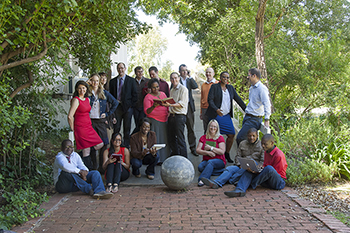Latest News Archive
Please select Category, Year, and then Month to display items
04 October 2024
|
Story Dr Cindé Greyling
|
Photo Supplied
 Scan the QR Code to unlock 30 days of exciting challenges to enhance your mental well-being.
Scan the QR Code to unlock 30 days of exciting challenges to enhance your mental well-being.
During October this year, the University of the Free State (UFS) Department of Student Counselling and Development (SCD) invites all staff and students to play an active part in their own mental health. Every day. You can do one small thing each day to improve your mental health. That is why the campaign is called DoDay – do something today and make it a do
day.
For 30 days, doable mental health activities will be shared on the UFS and SCD Instagram and Facebook pages. You will be invited to participate in the activity and to share your experience online. We encourage you to take up the challenge and share the skills for better mental health.
Be successful
As we approach the mid-year exam when staff and students are experiencing added pressure and anxiety, it is the perfect time to dedicate 10 to 15 minutes daily to your mental health. Each week we will focus on five different mental health building blocks: social wellness, emotional wellness, intellectual wellness, physical wellness, and spiritual wellness. By participating in the different activities each day, you will cover all the different wellness areas.
Be informed
During the campaign, we will also release insightful podcast interviews with experts who share their personal and professional experiences with each wellness area. It is no secret that communities are stronger together. Let us all work towards collectively improving our mental well-being and supporting one another on this journey.
Be happy
Improved mental health supports your professional and academic performance. It also helps you to make better decisions and enjoy life more. Improving your mental well-being has never been easier than following the DoDay calendar. You will receive clear guidelines on what to do each day, and you can mark off your progress and share your activities as you go.
Be a DoDay-er
Remember that maintaining mental well-being is like brushing your teeth, so we recommend it daily! Join the UFS Mental Health DoDay drive and take one small daily action for 30 days towards better mental health. Download your 30-day DoDay calendar – and remember to share and inspire others. Make every day a Mental Health DoDay
Prestige Scholars Programme invests in promising academics
2015-06-24

Photo: Sonia Small |
Whilst many academics find it challenging to have sustainable funding for specific projects, it is often just as challenging to find relevant exposure and good mentorship programmes to fully prepare academics toward becoming full professors.
Prof Jonathan Jansen, Vice-Chancellor and Rector of the UFS, designed the Vice-Chancellor’s Prestige Scholars Programme (PSP) specifically targeting newly-completed post-doctoral students who are already members of the academic staff.
The goal is to select the most promising young scholars and to make substantial institutional investment in their development.
To date, the PSP has produced 2 Fulbright scholars; 10 National Research Foundation (NRF) rated scholars; 1 NRF Blue Skies research project and 14 NRF Thuthuka-funded projects. These scholars work with the best academics at leading universities on three continents.
Prof Jackie du Toit, co-director of the programme, explains that while the PSP does not provide funding, it is a great programme to empower scholars by means of assistance towards generating funding from outside sources.
Prof Du Toit co-directs this programme with Proff Corli Witthuhn, Vice-Rector: Research and Niel Roos from the Department of Africa Studies.
“The PSP bases its approach to funding on the philosophy that young scholars are to be encouraged towards financial independence, based on a viable postdoctoral project that would sustain their scholarship for five to eight years post PhD. We believe that the cachet and long-term sustainability of existing funding programmes such as Fulbright outweighs the short-term benefits of automatic funding from the PSP. We also endeavour to teach young scholars to work cleverly within institutional parameters, rather than leave them floundering once they step off the active PSP.”